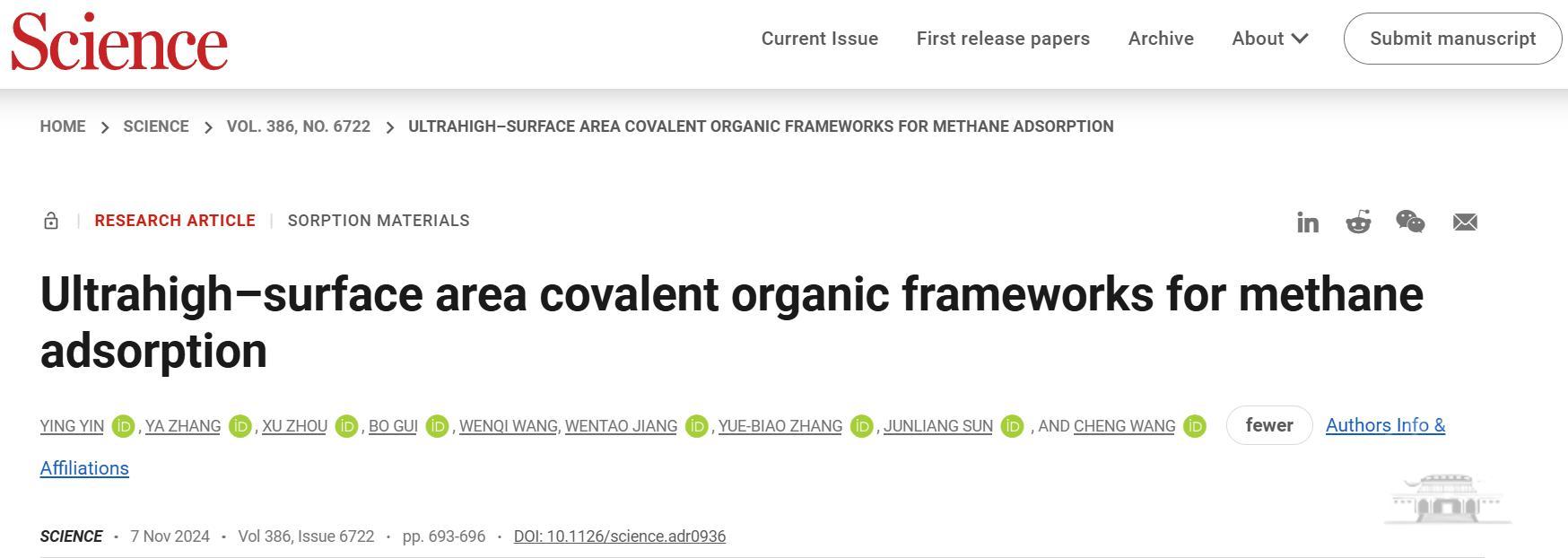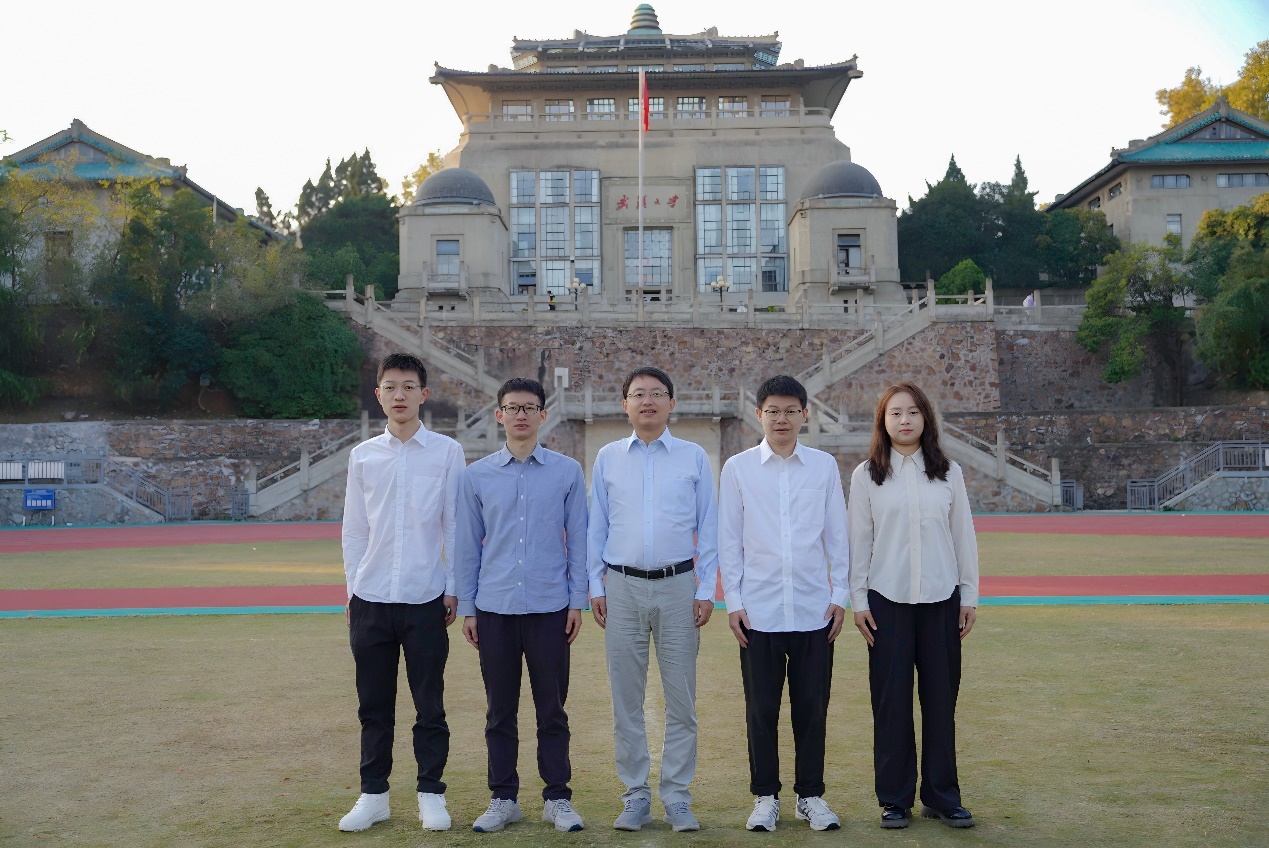On November 8, Beijing time, Science published online the latest research results of Professor Wang Cheng's team from the School of Chemistry and Molecular Science of Wuhan University on the use of ultrahigh-surfacearea covalent organic frameworks for methane adsorption,and the paper is entitled “Ultrahigh-surfacearea covalent organic frameworks for methane adsorption”. Ying Yin, a Ph.D. graduate from Wuhan University in the class of 2024, and Ph.D. students Ya Zhang (jointly cultivated by Peking University) and Xu Zhou are the co-first authors of the paper, while Prof. Cheng Wang and Prof. Junliang Sun of Peking University are the co-corresponding authors, and Associate Researcher Bo Gui of Wuhan University, Prof. Yuebiao Zhang of Shanghai University of Science and Technology (SUSTech), and Ph.D. students Wenqi Wang and Wentao Jiang are the co-first authors of the paper. Wuhan University is the first author.


From left to right: Zhou Xu, Gui Bo, Wang Cheng, Yin Ying, Zhang Ya
Natural gas (mainly methane), with its abundant reserves and low carbon emissions, is an important transition fuel that can replace traditional fossil fuels to meet carbon neutrality goals. Currently, high-density natural gas storage is dominated by liquefied natural gas (LNG) and compressed natural gas (CNG), which are characterized by high costs, energy consumption and safety concerns. In contrast, adsorbed natural gas technology utilizes methane adsorbents to achieve efficient storage at relatively low pressures, providing a safe, economical, and environmentally friendly storage alternative for on-board transportation applications. Methane adsorption studies with macroporous materials are currently available, but their performance still struggles to meet practical requirements due to the difficulty of balancing both mass , capacity and volume capacity. Theoretical analyses indicate that porous materials with excellent performance for methane adsorption should have high specific surface area (> 4000 m2g-1) and suitable pore size (0.8-1.5 nm). Covalent organic frameworks (COFs) are a new class of crystalline porous materials formed by organic molecular building blocks assembled by covalent bonding in two- or three-dimensional directions. Due to their inherent porosity and covalent bonding properties, ultra-high specific surface COFs can be used as a methane adsorbent with high stability if synthesized. Structurally, 3D COFs usually possess a higher specific surface area compared to 2D layered systems. However, the synthesis and structural characterization of 3D COFs face great challenges, and common framework interpenetration problems can significantly reduce their surface area. Therefore, it is significant but challenging to construct microporous 3D COFs with ultra-high specific surface area and suitable pore size for methane high-density storage applications.
Cheng Wang's team successfully designed and synthesized two Schiff base-connected ultra-high specific surface microporous three-dimensional COFs (3D-TFB-COF-Me/Et) by using six-connected steric nodes and triangular molecules as precursors in a condensation reaction. Structural analysis by 3D electron diffraction reveals that both 3D COFs have a rare self-interlocking topology (alb-3,6-Ccc2). By avoiding the tight stacking in the common interspersed topology, which reduces the framework pore size while ensuring the full exposure of the building blocks, both COFs exhibit ultra-high mass specific surface (~4400 m2g-1) and volume specific surface (~1900 m2cm-3) as well as suitable microporous pore size (1.1 nm). Methane adsorption experiments showed that both COFs possessed excellent high-pressure methane adsorption performance, e.g., the mass adsorption capacity of 3D-TFB-COF-Et was 429 mg g-1 and the volume adsorption capacity reached 264 cm3(STP) cm-3 at 298 K and 100 bar pressure.What's more, the 3D-TFB-COF-Et had a high mass adsorption capacity of 429 mg g-1 and a volume adsorption capacity of 264 cm3(STP) cm-3 at 298 K and 5-100 bar pressure. TFB-COF-Et's volumetric working capacity for methane exceeds all the crystalline porous materials reported so far. This study not only confirms the significant potential of COF for energy gas storage applications, but also provides an important guideline for the construction of porous materials with both high quality specific surface and bulk specific surface.

This work was supported by the National Natural Science Foundation of China (NSFC) under the Distinguished Youth Science Fund Program, the Joint Fund Key Support Program, the Top-level Program, and the Innovative Group Program of the Natural Science Foundation of Hubei Province, as well as the Wuhan University Research Public Service Conditional Platform.
Link to paper: https://www.science.org/doi/10.1126/science.adr0936
Link to Wang Cheng's group: http://chengwang.whu.edu.cn/
Rewritten by Jihong Sun


